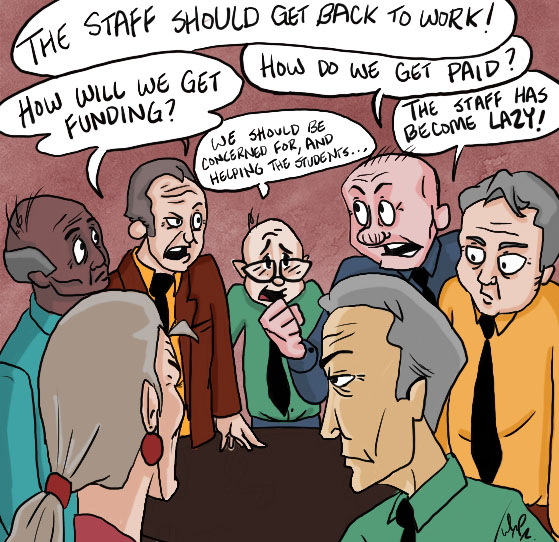Editorial

No one could have predicted how quickly the coronavirus has spread. So, if the board of trustees needs some time to figure out ways to support students, faculty and staff members, it’s understandable.
But for the past week, TCC has shown a lack of preparation and timeliness in its decisions regarding its response to the coronavirus pandemic, and it’s seriously hurting the college, not only in
the public’s eyes, but also the eyes of students’ and
employees.’
When Baylor University announced its students will transition online until April and that it will extend spring break, TCC students heard no new announcement on how their college would proceed until March 13, three days after Baylor, on the college’s website and social media platforms.
Then when other local colleges followed suit and announced that their students will have a longer break, it took hundreds of objections from the students and parents on social media platforms for TCC to notice and announce that it will also transition to the extended break schedule.
This reaction by TCC makes it seem as though the college may have had no public plan before spring break despite concerns regarding the outbreak, which had been discussed since late Feb. With such a large and diverse body of students, TCC should have been one of the first to acknowledge the situation. But they didn’t, and that was disappointing to the entire community.
Yet when they officially announced that students would have a longer break, they required staff and faculty members to continue working.
It portrayed a lack of regard for the health of TCC employees. For some unknown reason, their health problems were not properly addressed.
It’s difficult for parents who aren’t offered child care to go to work, knowing that they may need to use all of their sick time or paid time off to accommodate their family’s needs. One single father posted on social media that he was using all of his sick leave. And any staff member who had a weak immune system would have to risk their health to attend work.
The following week, when other colleges and universities updated their students daily, or even hourly, TCC students, faculty and staff were left largely in the dark. There was no information regarding how classes will meet or how students will be graduating — just silence.
At the board meeting March 19, the problem was barely addressed even as fear of spreading the virus resulted in four out of seven members calling into the meeting as a means of practicing social
distancing.
But by the next day, they announced that classes would resume March 23, and the professors would decide whether in-class attendance for their courses is mandatory.
By shifting the burden of troubleshooting, the faculty shouldered the transition from in-class to online instruction and the responsibility of figuring out how an online setup would work.
It was not right for the school to put undue pressure on students and faculty to cope with the changes without more guidance.
By March 20, TCC had announced it would close all campuses until further notice. Since then, the college has sent out multiple emails to remind and also assist its student body in how to navigate online courses.
Governor Greg Abbott closed schools through April 3, and Tarrant County issued a shelter-in-place order March 24. Faculty members who thought they could teach in person as recently as the morning of March 20 are now scrambling to move online. TCC continues to play catch up with the medical professionals’ recommendations urging further quarantine and school closures.
TCC is a good college that has helped many students of all ages and circumstances find success. However, in this particular issue, it could have done more to support its students, faculty, and staff.
One may have to wonder: Had they listened to their community earlier, would they have solved all these problems more effectively?
